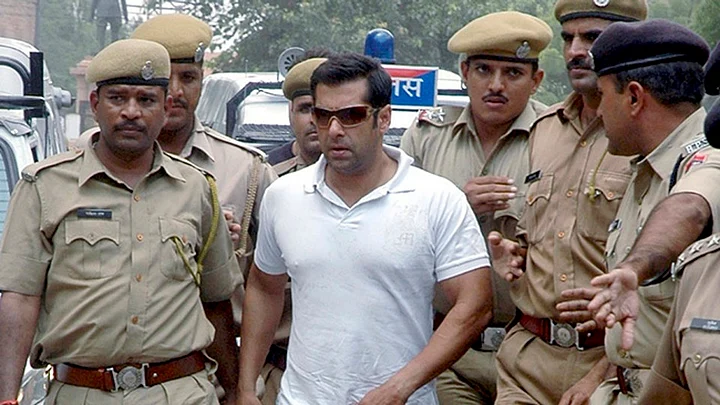Forty-two-year-old Ashok Singh, Salman Khan’s loyal driver for 22 years and counting, could evoke both condemnation and pity, depending upon which side of the prism one chooses to be on.
The prosecution chose the one of strict legality and urged the court to prosecute him for perjury, that is, lying under oath. The judge, on the other hand, considered the circumstances which could have compelled Singh to suddenly own up to his crime after a tortuous 13 years, and declined to initiate legal action.
How Just Is The Perjury Law
Singh’s lie – that he and not Salman was at the wheel that night – was evident, exposed more by the defence strategy of bringing him in at the fag end of the trial when every possible other plea had failed. And surely, Salim Khan didn’t hold a gun to his temple and made him agree to take the blame upon himself. For all we know, he might even have been offered a generous and hefty financial incentive.
But how just would it have been if the judge slapped him with charges under Section 193 of the Indian Penal Code which criminalises lying before a court, or retracting statements and testimonies given earlier? Think about it, if constable Ravindra Patil had succumbed to pressures and inducements and not to tuberculosis, and went back on his initial words, he would have been liable for prosecution, despite his own force doing absolutely nothing to protect his testimony from assault.
And this is the critical problem with the perjury law, especially when the legal system and law enforcement agencies do nothing to protect witnesses. Intimidation, forceful bribery, murders of witnesses is routine. Those who selflessly come to the aid of justice become susceptible to a maximum sentence of seven years’ imprisonment only for trying to save their own lives and limbs.
No Adequate Protection for the Witnesses
The judiciary itself can be blamed for a shockingly cavalier approach. The same Supreme Court judge who delivered the Best Bakery ruling in 2004 saw nothing wrong in holding Zaheera Sheikh guilty two years later. Besides sentencing her to jail and imposing a stiff fine, the court also directed the Income Tax department to probe and freeze her bank accounts.
There are cases galore where courts haven’t responded to pleas of providing police and state protection to witnesses in the way they ought to. There are also cases where the state and its agents haven’t been held sufficiently accountable for failure (in many cases deliberate) in safeguarding the safety and security of witnesses and whistleblowers.
On May 22, 2013, the Delhi High Court held actor Shayan Munshi and forensic expert P L Manocha guilty of deliberately lying and falsifying evidence in order to protect Jessica Lal’s killer. The court stated that while the mendacious deserved no mercy, those who want to speak the truth are coerced into silence. And because of this, witnesses turn hostile or are reluctant to come forward to testify, which are important reasons for an alarming number of acquittals.
Ashok Singh might have inadvertently reminded the courts and police of a duty oft forgotten.
